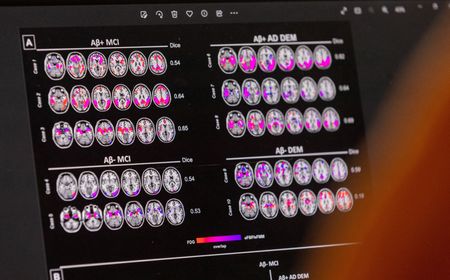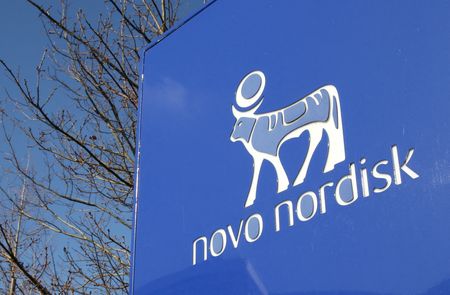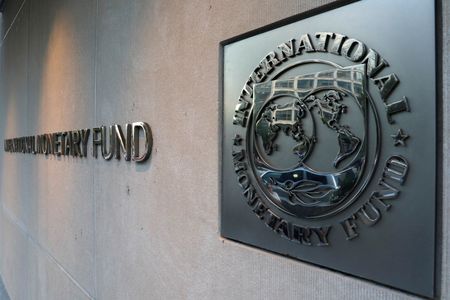By Stine Jacobsen, Maggie Fick and Jacob Gronholt-Pedersen
COPENHAGEN (Reuters) -Novo Nordisk’s closely-watched Alzheimer’s trials of an older oral version of its semaglutide drug failed to help slow the progression of the brain-wasting disease, the firm said on Monday, a blow to the obesity drug giant that sent its shares sliding.
The trials, which Novo had previously called a “lottery ticket” to underline its highly uncertain outcome, were testing whether the medicine could slow cognitive decline in patients.
The setback scuppers hopes for Novo that Alzheimer’s could open a major new market for GLP-1 medicines such as semaglutide, as it faces rising competition to its blockbuster drugs in its core treatment areas of obesity and diabetes.
Erik Berg-Johnsen, portfolio manager at Novo shareholder Storebrand Asset Management, told Reuters that the trial failure was likely “a nail in the coffin” for using its products against Alzheimer’s.
“The fact that the study was discontinued after two years, despite a planned third year extension, suggests that semaglutide offers virtually no benefit in slowing Alzheimer’s progression.”
Novo’s trial was being closely watched as an indication about whether GLP-1 drugs – used by millions for diabetes and weight loss – might slow disease progress.
The drug tested was Rybelsus, a pill approved only for type 2 diabetes. Like Novo’s blockbusters Ozempic and Wegovy, it contains semaglutide.
‘LOTTERY TICKET’ LOSES OUT
The company’s Executive Vice President for Product and Portfolio Strategy, Ludovic Helfgott, had described the Alzheimer’s trials as a “lottery ticket” in September, referring to its uncertain prospects yet huge potential.
Alzheimer’s disease and other dementias affect more than 55 million people globally. There is no cure.
“While semaglutide did not demonstrate efficacy in slowing the progression of Alzheimer’s disease, the extensive body of evidence supporting semaglutide continues to provide benefits for individuals with type 2 diabetes, obesity, and related comorbidities,” Chief Scientific Officer Martin Holst Lange said in a statement.
The results from the two trials of early-stage patients, called EVOKE and EVOKE+, are another setback for the Danish drugmaker and new CEO Mike Doustdar, which had seen booming success, driven by Ozempic and Wegovy, before slowing sales growth and a tumbling share price prompted a CEO change and mass layoffs.
The setback reinforces analyst scepticism about Novo’s Alzheimer’s ambitions, with UBS having estimated just a 10% probability of success.
Henrik Hallengreen Laustsen, Jyske Bank analyst, said however that a 10% share price fall on Monday looked like an “overreaction”.
Sydbank analyst Soren Lontoft Hansen said that the failure was not a surprise for Novo, which has had a tough year with slowing sales of its key weight-loss drugs, management overhaul and rising competition from U.S. peer Eli Lilly .
“The share’s reaction is probably more due to the bad sentiment around the Novo Nordisk shares and the negative news flow over the past year – perhaps there was hope for a little tailwind from this study.”
PARTICIPANTS AGED 55 TO 85
Shares of Biogen jumped about 5% premarket following news of Novo’s Alzheimer’s trial failure. Biogen and partner Eisai’s Leqembi and rival Eli Lilly’s Kisunla are the only approved treatments for Alzheimer’s in the United States. Both drugs require infusions or injections and can cause significant side effects.
“There was some fear that Ozempic might reduce the opportunity for Leqembi and other Alzheimer’s drugs by preventing progression of disease. So these data lift a potential competitive overhang,” said Cantor analyst Eric Schmidt.
The Rybelsus trials, covering a combined 3,808 patients, were the first large trials for patients with early stage Alzheimer’s.
The trials used a ratings system to assess clinical changes in areas such as memory and how patients were able to care for themselves over a two-year period. The studies aimed for a 20% slowing of cognitive decline, trial details show.
Wall Street analysts viewed the trials as high-risk, high-reward, and had said the data would determine if Novo’s Alzheimer’s programme could become a future growth driver.
(Writing by Stine Jacobsen and Maggie Fick; Editing by Terje Solsvik, Anna Ringstrom and Louise Heavens)












